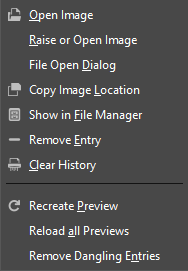El diálogo histórico muestra la lista de documentos que han estado abiertos en la sesión anterior. Es más completa que la lista que se obtiene con el comando “Abrir reciente”.
Este diálogo es un diálogo acoplable; consulte la Sección 2.3, “Diálogos y acoplables” para obtener ayuda sobre su uso.
Puede acceder:
-
From the main menu: → → .
-
From the Tab menu in any dockable dialog by clicking on
and selecting → .
-
From the main menu: → → .
La barra de desplazamiento le permite navegar por todas las imágenes que ha abierto antes.
En el menú de pestaña para el diálogo “Historial del documento”, puede elegir entre y . En modo rejilla, los documentos se depositan en una tabla rectangular. En modo lista, se alinean verticalmente, en cada fila se muestra una miniatura del contenido de la imagen, su nombre y sus dimensiones en píxeles.
![[Sugerencia]](images/tip.png)
|
Sugerencia |
|---|---|
|
Ctrl+F abre un campo de búsqueda. Consulte la View as List |
Use the Open the selected entry
button or command of the dialog's
context menu, to open the image you have selected. With the
Shift key pressed, it raises an image hidden behind
others. With the Ctrl key pressed, it opens the Open
Image dialog.
Use the Remove the selected entry
button or command of the dialog's
context menu, to remove an image from the History dialog. The image
is removed from the recently open images list also. But the image itself
is not deleted.
Use the Clear the entire file history
button or command of the
dialog's context menu, to remove all the files from the history.
Use the Recreate Preview
button or command of the
dialog's context menu, to update preview in case of change.
With Shift key pressed, it acts on all previews.
With Ctrl key pressed, previews that
correspond to files that can't be found out, are deleted.
- Visión general
-
You can get the document history context menu by right clicking on a file in the document history dialog, or by clicking the tab menu button
and opening the submenu. Several of the operations are also available through buttons at the bottom of the dialog. Those operations are documented above. The remaining ones are listed below.





